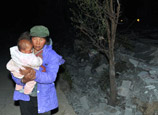
A recently coined buzzword describes these inept and helpless young people - bu zhan guo. It literally means "non-stick pan" and is pronounced the same as "never touch a pan."
"My husband and I don't give much thought to this but it would be wrong to say we are not worried at all," says 60-year-old Lu Yun, Zhang's mother. "Who will take care of them when we are too old to do the housework?"
She admits, however, that she and her husband didn't bother to teach their daughter how to cook before she got married. "On one hand, we only hoped she could focus on study and later on work," says Lu. "We thought cooking was something she would naturally know how to do, but now it seems we were quite wrong."
Since many young people tend to live near their parents after they marry and spend a lot of time with their in-laws, they never need to learn to do chores by themselves.
Young couples who want more freedom and don't live with or near their parents find other ways to take care of tedious domestic details.
If they can, they hire an ayi for cooking and laundry. Or, if they live nearby, they can dine frequently with their parents and then go back to their own home.
Of course, these are young people with some means and many blue-collar young people learn to take care of themselves.
Sheen Li, a 37-year-old mother of two girls, says their ayi has worked for them for more than 10 years.
She cooks, cleans and does laundry, ironing, shopping and everything else.
"My husband is unable to do virtually anything, while I spend most of my time taking care of our daughters," Li says. "Our ayi is very kind and helpful. We love her cooking and trust her like family."
Meanwhile, 28-year-old Zhang Wen, an assistant legal adviser, and her husband live just across the street from their parents home.
"My husband and I go to my parents' place to have dinner every day," she says, "and sometimes we bring some food back home so we can reheat it for dinner the next day."
Zhang says she can cook several simple dishes, while her husband is a typical bu zhan guo. "He only knows how to make instant noodles," she says.
Many young people choose to buy their own apartment near their parents' after they marry. This gives them privacy, and it's also convenient to take care of their parents as they get older.
People call this kind of separation "the distance of a bowl of soup," indicating that the small distance means children can send their parents a bowl of hot soup, which arrives when it's still hot.
But the fact is that the proximity also makes it easier for parents to look after their married children.
"When we are old or sick, my daughter and son-in-law will come over and take care of us, but for now, it's actually the other way round," says Zhang's mother who gave her name as Li. "I think we will even take care of their child in the near future."
In fact, this lack of life skills has been a cause of concern for a long time at colleges and universities, which are supposed to help young people become independent.
When freshmen register for their first semester in college, it's common for parents to drive them to the campus and do everything for them, creating traffic chaos and disorder in the registration process.
Last September Shanghai's Tongji University set up a "parents keep-out" line on registration day. While students completed the paperwork, parents waited outside beyond the line.
Some parents were so anxious that they were constantly talking to their children on the phone, repeatedly reminding them of where they had packed their letter of admission and other items in their backpack.
"I was super-anxious at that time," recalls a father surnamed Zhang from Anhui Province who accompanied his son. "I was worried whether my son took all the materials with him and whether he had enough money."
Zhang says he attempted to sneak through the keep-out line, but was spotted by a security guard, who asked him to stay back.
The university says they took the step to send the message to parents that their children can do just fine without being escorted and having their hands held all the time.
"We have been closely watching new students for the past several years to find out that they actually can be quite independent," says Qi Ming, a university administrative officer.
Registering all by themselves does not necessarily mean that students manage the rest of their lives on their own.
"It is not that I can't do chores, but I just didn't want to spend time on it back in college," says Cai Fenghua, a fresh graduate in communications technology at Shanghai University. "And my major put a lot of pressure on us (roommates), our spare time was quite limited, so we agreed to hire an ayi to do the work for us."
In her dormitory, four students share a room and 12 students share a bathroom and living room.
"When we were freshmen, at first we took turns to clean the bathroom and living room, but gradually no one did the work anymore maybe because everybody was too busy to care," she says. "Then the sanitation situation in the bathroom became a bit unbearable, so we believed that hiring an ayi would be a good way out."
The 12 students shared the cost of the ayi, which wasn't much per person. "And many of our parents supported us financially," Cai says.
Sociologists say young people who never touch a pan or iron a shirt is getting to be a trend, part of a new urban lifestyle.
"Take cooking for example. Today people, especially white-collar professionals, tend to treat meals less seriously than their parents' generation," says sociology professor Gu Xiaoming at Fudan University. "When they believe that having a meal is the same as having a snack, of course, they would not bother to spend time on cooking or learning to cook."
Gu doesn't believe everyone has lost basic life skills and says some young people are quite competent.
"My son, who just got married, does half the chores at home, and his wife does the other half," he says. "But it is a truth that fewer and fewer people spend time doing cooking and housework because of the changing of lifestyle."

















 Missing baby killed in Changchun
Missing baby killed in Changchun


![]()
